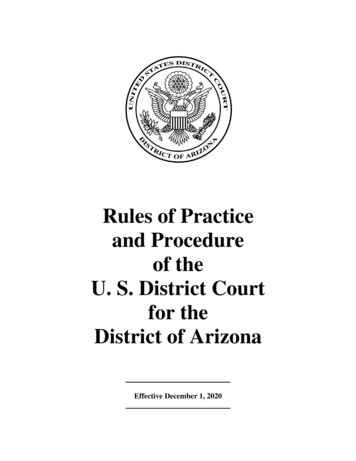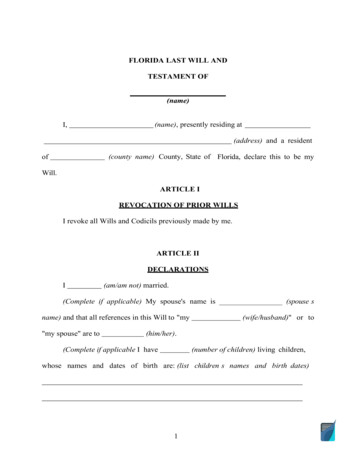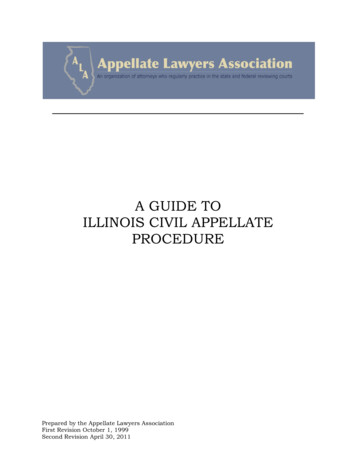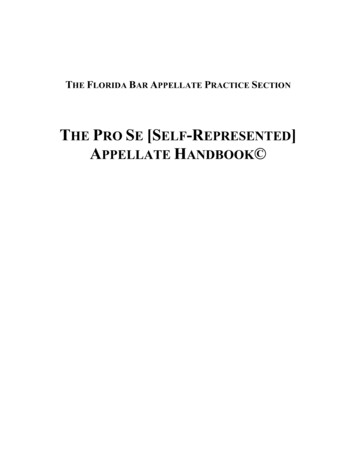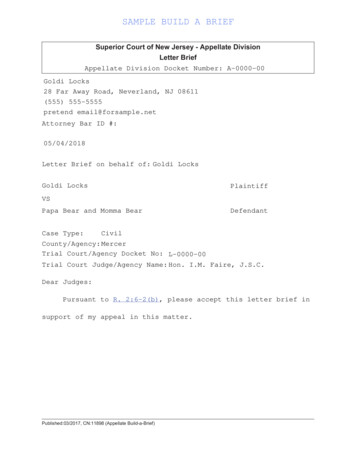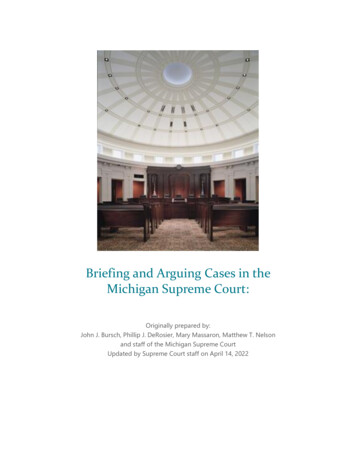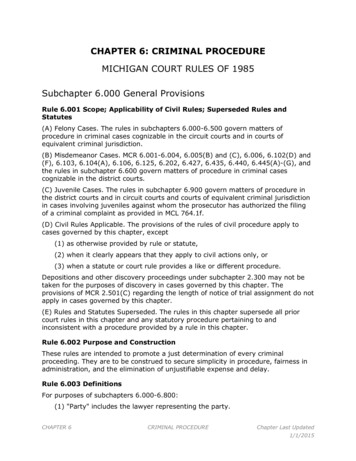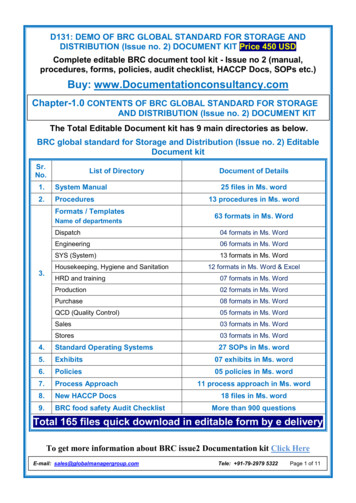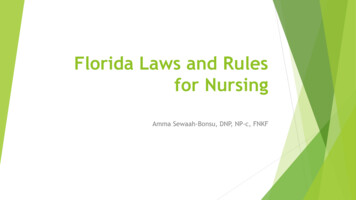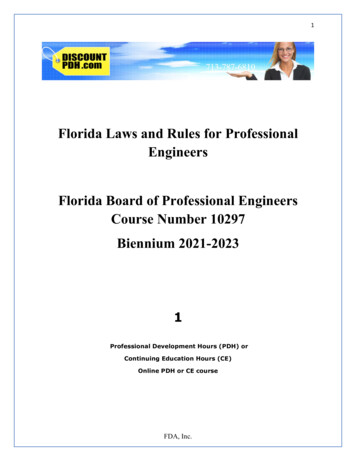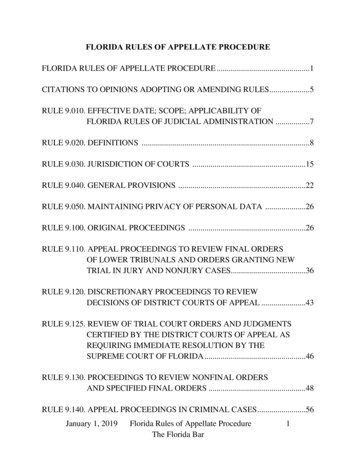
Transcription
FLORIDA RULES OF APPELLATE PROCEDUREFLORIDA RULES OF APPELLATE PROCEDURE .1CITATIONS TO OPINIONS ADOPTING OR AMENDING RULES.5RULE 9.010. EFFECTIVE DATE; SCOPE; APPLICABILITY OFFLORIDA RULES OF JUDICIAL ADMINISTRATION .7RULE 9.020. DEFINITIONS .8RULE 9.030. JURISDICTION OF COURTS .15RULE 9.040. GENERAL PROVISIONS .22RULE 9.050. MAINTAINING PRIVACY OF PERSONAL DATA .26RULE 9.100. ORIGINAL PROCEEDINGS .26RULE 9.110. APPEAL PROCEEDINGS TO REVIEW FINAL ORDERSOF LOWER TRIBUNALS AND ORDERS GRANTING NEWTRIAL IN JURY AND NONJURY CASES.36RULE 9.120. DISCRETIONARY PROCEEDINGS TO REVIEWDECISIONS OF DISTRICT COURTS OF APPEAL .43RULE 9.125. REVIEW OF TRIAL COURT ORDERS AND JUDGMENTSCERTIFIED BY THE DISTRICT COURTS OF APPEAL ASREQUIRING IMMEDIATE RESOLUTION BY THESUPREME COURT OF FLORIDA .46RULE 9.130. PROCEEDINGS TO REVIEW NONFINAL ORDERSAND SPECIFIED FINAL ORDERS .48RULE 9.140. APPEAL PROCEEDINGS IN CRIMINAL CASES .56January 1, 2019Florida Rules of Appellate ProcedureThe Florida Bar1
RULE 9.141. REVIEW PROCEEDINGS IN COLLATERALOR POSTCONVICTION CRIMINAL CASES .71RULE 9.142. PROCEDURES FOR REVIEW IN DEATHPENALTY CASES .78RULE 9.145. APPEAL PROCEEDINGS IN JUVENILE DELINQUENCYCASES .85RULE 9.146. APPEAL PROCEEDINGS IN JUVENILE DEPENDENCYAND TERMINATION OF PARENTAL RIGHTS CASESAND CASES INVOLVING FAMILIES AND CHILDREN INNEED OF SERVICES .87RULE 9.147. APPEAL PROCEEDINGS TO REVIEW FINAL ORDERSDISMISSING PETITIONS FOR JUDICIAL WAIVER OFPARENTAL NOTICE OF TERMINATION OF PREGNANCY .94RULE 9.150. DISCRETIONARY PROCEEDINGS TO REVIEW CERTIFIEDQUESTIONS FROM FEDERAL COURTS .95RULE 9.160. DISCRETIONARY PROCEEDINGS TO REVIEWDECISIONS OF COUNTY COURTS .96RULE 9.170. APPEAL PROCEEDINGS IN PROBATE ANDGUARDIANSHIP CASES .98RULE 9.180. APPEAL PROCEEDINGS TO REVIEW WORKERS’COMPENSATION CASES .101RULE 9.190. JUDICIAL REVIEW OF ADMINISTRATIVE ACTION .112RULE 9.200. THE RECORD .119RULE 9.210. BRIEFS .127January 1, 2019Florida Rules of Appellate ProcedureThe Florida Bar2
RULE 9.220. APPENDIX .134RULE 9.225. NOTICE OF SUPPLEMENTAL AUTHORITY .136RULE 9.300. MOTIONS .137RULE 9.310. STAY PENDING REVIEW .140RULE 9.315. SUMMARY DISPOSITION .143RULE 9.320. ORAL ARGUMENT .144RULE 9.330. REHEARING; CLARIFICATION; CERTIFICATION;WRITTEN OPINION .145RULE 9.331. DETERMINATION OF CAUSES IN A DISTRICTCOURT OF APPEAL EN BANC .148RULE 9.340. MANDATE .151RULE 9.350. DISMISSAL OF CAUSES .152RULE 9.360. PARTIES .153RULE 9.370. AMICUS CURIAE .155RULE 9.380. NOTICE OF RELATED CASE OR ISSUE .156RULE 9.400. COSTS AND ATTORNEYS’ FEES .157RULE 9.410. SANCTIONS .158RULE 9.420. FILING; SERVICE OF COPIES;COMPUTATION OF TIME .160January 1, 2019Florida Rules of Appellate ProcedureThe Florida Bar3
RULE 9.430. PROCEEDINGS BY INDIGENTS .164RULE 9.440. ATTORNEYS .165RULE 9.500. ADVISORY OPINIONS TO GOVERNOR .166RULE 9.510. ADVISORY OPINIONS TO ATTORNEY GENERAL .167RULE 9.600. JURISDICTION OF LOWER TRIBUNAL PENDINGREVIEW .168RULE 9.700. MEDIATION RULES .170RULE 9.710. ELIGIBILITY FOR MEDIATION .171RULE 9.720. MEDIATION PROCEDURES .172RULE 9.730. APPOINTMENT AND COMPENSATION OF THEMEDIATOR .174RULE 9.740. COMPLETION OF MEDIATION .175RULE 9.800. UNIFORM CITATION SYSTEM .175RULE 9.900. FORMS.183January 1, 2019Florida Rules of Appellate ProcedureThe Florida Bar4
CITATIONS TO OPINIONS ADOPTING OR AMENDING RULES1962 REVISION, effective 10-1-62: 142 So. 2d 724OTHER OPINIONSEffective DateEffective 3-1-78:Effective 1-1-80:Effective 1-1-80:Effective 1-1-80:Effective 4-1-80:Effective 1-1-81:Effective 1-1-81:Citation351 So.2d 981.374 So.2d 992.376 So.2d 844.377 So.2d 700.381 So.2d 1370.387 So.2d 920.391 So.2d 203.Effective 10-1-82:Effective 12-15-83:Effective 10-1-84;1-1-85:Effective 3-1-85:Effective 3-19-87:Effective 7-1-87:Effective 1-1-89:Effective 1-1-89:Effective 7-9-92:Effective 1-1-93:Effective 12-5-94:Effective 6-15-95:Effective 10-12-95:Effective 1-1-96:Effective 7-1-96:Effective 8-29-96:Effective 1-1-97:Effective 7-1-99:Effective 11-12-99:Effective 1-1-00:Effective 1-1-01:Effective 10-18-01:Effective 1-1-03:Effective 1-1-03:Effective 10-23-03:Effective 1-1-04:Effective 10-1-04:Effective 10-1-04:Effective 2-3-05:Effective 4-7-05:Effective 1-19-06:Effective 7-6-06:Effective 11-9-06:Effective 1-1-07:Effective 11-15-07:Effective 1-1-08:Effective 9-25-08:Effective 12-30-08:Effective 1-1-09:Effective 1-29-09:Effective 1-29-09:Effective 7-16-09:Effective 10-15-09:416 So.2d 1127.443 So.2d 972.463 So.2d 1114.DescriptionComplete revision.Adopted 9.331.Added 9.140(b)(3).Amended 9.331.Amended 9.030–9.150, 9.220.Four-year-cycle revision. Amended 9.100, 9.200, 9.300, 9.420, 9.600.Amended 9.030, 9.100–9.130, 9.200, 9.210, 9.900; ordered publication of1980 committee notes.Amended 9.331.Added 9.140(c)(1)(J).Amended and adopted numerous rules.463 So.2d 1124.505 So.2d 1087.509 So.2d 276.529 So.2d 687.536 So.2d 240.605 So.2d 850.609 So.2d 516.646 So.2d 730.657 So.2d 897.661 So.2d 815.663 So.2d 1314.675 So.2d 1374.678 So.2d 315.685 So.2d 773.756 So.2d 27.761 So.2d 1015.760 So.2d 74.780 So.2d 834.807 So.2d 633.827 So.2d 888.837 So.2d 911858 So.2d 1013.860 So.2d 394.875 So.2d 563.887 So.2d 1090.894 So.2d 202.901 So.2d 109.919 So.2d 431.934 So.2d 438942 So.2d 406.941 So.2d 352.969 So.2d 357.967 So.2d 194.992 So.2d 233.1 So.3d 163.2 So.3d 89.1 So.3d 166.1 So.3d 168.13 So.3d 1044.20 So.3d 380.Deleted 9.165; replaced 9.030(b)(4), 9.160.Amended 9.420(e).Adopted 9.315; amended 9.140(c)(1)(J), 9.200, 9.600, 9.900(g).Amended numerous rules.Clarified 529 So.2d 687.Amended 9.130(a)(3).Four-year-cycle revision. Numerous amendments.Amended 9.331.Amended 9.600.Amended 9.800(n).Amended 9.130(a).Amended 9.020(g).Added court commentary to 9.140.Four-year-cycle revision. Numerous amendments.Amended 9.110(l).Amended 9.020(h), 9.140, 9.600.Amended 9.100(g), (j)–(k).Four-year-cycle revisions. Numerous amendments.Amended 9.140 and 9.141.Two-year-cycle revisions. Numerous amendments.Amended 9.140; adopted 9.142.Amended 9.110.Amended 9.360(b).Amended 9.140.Amended 9.190, 9.200.Two-year-cycle revisions. Numerous amendments.Amended 9.140(c)(1).Amended 9.160, 9.420(d).Amended 9.110, 9.900.Adopted 9.510.Amended 9.120, 9.140, 9.146, 9.180, 9.200, 9.210, 9.300, 9.370.Amended 9.141, 9.142.Amended 9.300.Amended 9.141(c).Amended 9.142.Three-year cycle revisions. Numerous amendments.Amended 9.110(b), (g), 9.360.Amended 9.141(c).Amended 9.140, 9.200, 9.900(h).Amended 9.142, 9.200.January 1, 2019Florida Rules of Appellate ProcedureThe Florida Bar5
Effective DateEffective 11-12-09Effective 3-18-10:Effective 7-1-10:Effective 12-1-10:Effective 7-1-11:Effective 10-1-11:Effective 1-1-12:Effective 3-1-12:Effective 6-14-12:Effective 9-1-12:Effective 10-1-12:Effective 2-27-13for Supreme Courtof Florida andeffective 7-22-1312-27-13 forDistrict Courts ofAppeal:Effective 7-01-13:Effective 9-26-13:Effective 1-1-14:Effective 2-20-14:Effective 1-1-15:Effective 1-1-15:Citation24 So.3d 47.31 So.3d 756.41 So.3d 161.41 So.3d 885.72 So.3d 735.80 So.3d 317.84 So.3d 192.84 So.3d 224.93 So.3d 325.102 So.3d 505.95 So.3d 96.102 So.3d 451.DescriptionAmended 9.146, 9.340, 9430.Amended 9.040(i), 9.100(d), 9.110.Added 9.700, 9.710, 9.730, 9.740.Amended 9.300, 9.400, 9.410.Amended 9.141, 9.142.Adopted 9.050.Three-year cycle revisions. Numerous amendments.Amended 9.110(n).Amended 9.200.Amended 9.420.Amended 9.420.Amended 9.020, 9.110, 9.120, 9.125, 9.130, 9.140, 9.141, 9.142, 9.145, 9.146,9.160, 9.180, 9.200, 9.210, 9.220, 9.360, 9.500, 9.510, 9.900.123 So.3d 734.123 So.3d 53.125 So.3d 743.133 So.3d 927.148 So.3d 1171.183 So.3d 245.Effective 1-1-15:Effective 3-12-15:Effective 8-27-15:Effective 10-1-15:Effective 10-8-15:Effective 1-5-16:Effective 7-1-16:Effective 7-1-16:Effective 9-29-16:Effective 3-23-17:Effective 10-1-17:Effective 1-1-19:151 So.3d 1217.160 So.3d 62.173 So.3d 951.173 So.3d 953.176 So.3d 980.177 So.3d 1254.194 So.3d 309.204 So.3d 13.200 So.3d 1221.213 So.3d 803.225 So.3d 223.43 FLW S508.Effective 1-1-19:Effective 1-1-19:43 FLW S512.43 FLW S515.Effective 1-1-19:43 FLW S602.Amended 9.140, 9.141.Amended 9.140.Amended 9.340.Clarified 9.110Amended 9.142.Amended 9.020, 9.100, 9.110, 9.130, 9.140, 9.141, 9.142, 9.145, 9.146, 9.160,9.180, 9.190, 9.210, 9.300, 9.320, 9.330, 9.331, 9.340, 9.350, 9.400, 9.410,9.420, 9.430, 9.600, 9.720, 9.800, 9.900. Adopted 9.147.Amended 9.130.Amended 9.210.Amended 9.210.Amended 9.210.Amended 9.140.Amended 9.200 and 9.210.Amended 9.140.Amended 9.140.Amended 9.141.Amended 9.146.Amended 9.020, 9.120, 9.141, 9.160, 9.180, 9.220, and 9.220.Amended 9.010, 9.020, 9.030, 9.040, 9.100, 9.110, 9.120, 9.125, 9.130, 9.140,9.141, 9.142, 9.145, 9.146, 9.150, 9.160, 9.170, 9.180, 9.190, 9.200, 9.210,9.225, 9.310, 9.330, 9.331, 9.350, 9.360, 9.370, 9.400, 9.410, 9.420, 9.430,9.500, 9.510, 9.700, 9.710, 9.720, 9.900. Adopted 9.380Amended 9.800.Amended 9.100, 9.110, 9.120, 9.125, 9.130, 9.140, 9.141, 9.142, 9.146, 9.180,9.200, 9.210, 9.300, 9.320, 9.330, 9.331, 9.350, 9.360, 9.410.Amended 9.146 and 9.210.NOTE TO USERS: Rules in this pamphlet are current through 43 FLW S602.Subsequent amendments, if any, can be found l. The Florida Bar also updatesthe rules on its website at www.floridabar.org (on the homepage, click on “RulesUpdates”).January 1, 2019Florida Rules of Appellate ProcedureThe Florida Bar6
RULE 9.010.EFFECTIVE DATE; SCOPE; APPLICABILITY OFFLORIDA RULES OF JUDICIAL ADMINISTRATIONThese rules, cited as “Florida Rules of Appellate Procedure,” andabbreviated “Fla. R. App. P.,” shall take effect at 12:01 a.m. on March 1, 1978.They shall govern all proceedings commenced on or after that date in the supremecourt, the district courts of appeal, and the circuit courts in the exercise of thejurisdiction described by rule 9.030(c); provided that any appellate proceedingcommenced before March 1, 1978, shall continue to its conclusion in the court inwhich it is then pending in accordance with the Florida Appellate Rules, 1962Amendment.The Florida Rules of Judicial Administration are applicable in allproceedings governed by these rules, except as otherwise provided by these rules.These rules shall supersede all conflicting statutes and, as provided in Florida Ruleof Judicial Administration 2.130, all conflicting rules of procedure.Committee Notes1977 Amendment. The rules have been re-numbered to conform with the numberingsystem adopted by the Florida Supreme Court for all of its rules of practice and procedure, and toavoid confusion with the former rules, which have been extensively revised. The abbreviatedcitation form to be used for these rules appears in this rule and in rule 9.800.This rule sets an effective date and retains the substance of former rules 1.1, 1.2, and 1.4.A transition provision has been incorporated to make clear that proceedings already in theappellate stage before the effective date will continue to be governed by the former rules until thecompletion of appellate review in the court in which it is pending on the effective date. If reviewis sought after March 1, 1978, of an appellate determination made in a proceeding filed in theappellate court before that date, the higher court may allow review to proceed under the formerrules if an injustice would result from required adherence to the new rules. Unnecessarylanguage has been deleted and the wording has been simplified. Specific reference has beenmade to rule 9.030(c) to clarify those aspects of the jurisdiction of the circuit courts governed bythese rules.1992 Amendment. This rule was amended to eliminate the statement that the FloridaRules of Appellate Procedure supersede all conflicting rules. Other sets of Florida rules containprovisions applicable to certain appellate proceedings, and, in certain instances, those rulesconflict with the procedures set forth for other appeals under these rules. In the absence of a clearJanuary 1, 2019Florida Rules of Appellate ProcedureThe Florida Bar7
mandate from the supreme court that only the Florida Rules of Appellate Procedure are toaddress appellate concerns, the committee felt that these rules should not automaticallysupersede other rules. See, e.g., In the Interest of E.P. v. Department of Health and RehabilitativeServices, 544 So. 2d 1000 (Fla. 1989).1996 Amendment. Rule of Judicial Administration 2.135 now mandates that the Rules ofAppellate Procedure control in all appellate proceedings.RULE 9.020.DEFINITIONSThe following terms have the meanings shown as used in these rules:(a)Administrative Action. Administrative action shall include:(1) final agency action as defined in the Administrative ProcedureAct, chapter 120, Florida Statutes;(2) nonfinal action by an agency or administrative law judgereviewable under the Administrative Procedure Act;(3) quasi-judicial decisions by any administrative body, agency,board or commission not subject to the Administrative Procedure Act; and(4)administrative action for which judicial review is provided bygeneral law.(b) Clerk. The person or official specifically designated as such for thecourt or lower tribunal; if no person or official has been specifically so designated,the official or agent who most closely resembles a clerk in the functionsperformed.(c) Court. The supreme court; the district courts of appeal; and the circuitcourts in the exercise of the jurisdiction described by rule 9.030(c), including thechief justice of the supreme court and the chief judge of a district court of appeal inthe exercise of constitutional, administrative, or supervisory powers on behalf ofsuch courts.January 1, 2019Florida Rules of Appellate ProcedureThe Florida Bar8
(d) Family Law Matter. A matter governed by the Florida Family LawRules of Procedure.(e) Lower Tribunal. The court, agency, officer, board, commission,judge of compensation claims, or body whose order is to be reviewed.(f)Order. A decision, order, judgment, decree, or rule of a lowertribunal, excluding minutes and minute book entries.(g)Parties.(1)Appellant. A party who seeks to invoke the appeal jurisdictionof a court.(2) Appellee. Every party in the proceeding in the lower tribunalother than an appellant.(3)Petitioner. A party who seeks an order under rule 9.100 or rule(4)Respondent. Every other party in a proceeding brought by a9.120.petitioner.(h) Rendition (of an Order). An order is rendered when a signed, writtenorder is filed with the clerk of the lower tribunal.(1) Motions Tolling Rendition. The following motions, ifauthorized and timely filed, toll rendition unless another applicable rule ofprocedure specifically provides to the contrary:(A)motion for new trial;(B)motion for rehearing;(C)motion for certification;(D)motion to alter or amend;January 1, 2019Florida Rules of Appellate ProcedureThe Florida Bar9
(E)motion for judgment in accordance with prior motion for(F)motion for arrest of judgment;(G)motion to challenge the verdict;directed verdict;(H) motion to correct a sentence or order of probationpursuant to Florida Rule of Criminal Procedure 3.800(b)(1);(I)motion to withdraw a plea after sentencing pursuant toFlorida Rule of Criminal Procedure 3.170(l); or(J)motion to vacate an order based upon therecommendations of a hearing officer in accordance with Florida Family Law Ruleof Procedure 12.491.(2) Effect of Motions Tolling Rendition. If an authorized andtimely motion listed in subdivision (h)(1) of this rule has been filed in the lowertribunal directed to a final order, the following apply:(A) The final order shall not be deemed rendered as to anyexisting party until the filing with the clerk of a signed, written order disposing ofthe last of such motions.(B) A signed, written order granting a new trial shall bedeemed rendered when filed with the clerk, notwithstanding that other suchmotions may remain pending at the time.(C) If a notice of appeal is filed before the filing with theclerk of a signed, written order disposing of all such motions, the appeal shall beheld in abeyance until the filing with the clerk of a signed, written order disposingof the last such motion.(i)Rendition of an Appellate Order. If any timely and authorizedmotion under rule 9.330 or 9.331 is filed, the order shall not be deemed rendered asJanuary 1, 2019Florida Rules of Appellate ProcedureThe Florida Bar10
to any party until all of the motions are either withdrawn or resolved by the filingof a written order.(j)Conformed Copy. A true and accurate copy.(k) Signed. A signed document is one containing a signature as providedby Florida Rule of Judicial Administration 2.515(c).(l )E-filing System Docket. The docket where attorneys and thoseparties who are registered users of the court’s electronic filing (e-filing) system canview the electronic documents filed in their case(s).Committee Notes1977 Amendment. This rule supersedes former rule 1.3. Throughout these rules thedefined terms have been used in their technical sense only, and are not intended to altersubstantive law. Instances may arise in which the context of the rule requires a different meaningfor a defined term, but these should be rare.The term “administrative action” is new and has been defined to make clear theapplication of these rules to judicial review of administrative agency action. This definition wasnot intended to conflict with the Administrative Procedure Act, chapter 120, Florida Statutes(1975), but was intended to include all administrative agency action as defined in theAdministrative Procedure Act. The reference to municipalities is not intended to conflict witharticle VIII, section 1(a), Florida Constitution, which makes counties the only politicalsubdivisions of the state.The term “clerk” retains the substance of the term “clerk” defined in the former rules.This term includes the person who in fact maintains records of proceedings in the lower tribunalif no person is specifically and officially given that duty.The term “court” retains the substance of the term “court” defined in the former rules, buthas been modified to recognize the authority delegated to the chief justice of the supreme courtand the chief judges of the district courts of appeal. This definition was not intended to broadenthe scope of these rules in regard to the administrative responsibilities of the mentioned judicialofficers. The term is used in these rules to designate the court to which a proceeding governed bythese rules is taken. If supreme court review of a district court of appeal decision is involved, thedistrict court of appeal is the “lower tribunal.”The term “lower tribunal” includes courts and administrative agencies. It replaces theterms “commission,” “board,” and “lower court” defined in the former rules.January 1, 2019Florida Rules of Appellate ProcedureThe Florida Bar11
The term “order” has been broadly defined to include all final and interlocutory rulings ofa lower tribunal and rules adopted by an administrative agency. Minute book entries areexcluded from the definition in recognition of the decision in Employers’ Fire Ins. Co. v.Continental Ins. Co., 326 So. 2d 177 (Fla. 1976). It was intended that this rule encourage theentry of written orders in every case.The terms “appellant,” “appellee,” “petitioner,” and “respondent” have been definedaccording to the rule applicable to a particular proceeding and generally not according to thelegal nature of the proceeding before the court. The term “appellee” has been defined to includethe parties against whom relief is sought and all others necessary to the cause. This rulesupersedes all statutes concerning the same subject matter, such as section 924.03, FloridaStatutes (1975). It should be noted that if a certiorari proceeding is specifically governed by arule that only refers to “appellant” and “appellee,” a “petitioner” and “respondent” shouldproceed as if they were “appellant” and “appellee,” respectively. For example, certiorariproceedings in the supreme court involving the Public Service Commission and IndustrialRelations Commission are specifically governed by rule 9.110 even though that rule only refersto “appellant” and “appellee.” The parties in such a certiorari proceeding remain designated as“petitioner” and “respondent,” because as a matter of substantive law the party invoking thecourt’s jurisdiction is seeking a writ of certiorari. The same is true of rule 9.200 governing therecord in such certiorari proceedings.The term “rendition” has been simplified and unnecessary language deleted. The filingrequirement of the definition was not intended to conflict with the substantive right of reviewguaranteed by the Administrative Procedure Act, section 120.68(1), Florida Statutes (Supp.1976), but to set a point from which certain procedural times could be measured. Motions thatpostpone the date of rendition have been narrowly limited to prevent deliberate delaying tactics.To postpone rendition the motion must be timely, authorized, and one of those listed. However,if the lower tribunal is an administrative agency whose rules of practice denominate motionsidentical to those listed by a different label, the substance of the motion controls and rendition ispostponed accordingly.The definition of “legal holiday” has been eliminated but its substance has been retainedin rule 9.420(e).The term “bond” is defined in rule 9.310(c)(1).Terms defined in the former rules and not defined here are intended to have their ordinarymeanings in accordance with the context of these rules.1992 Amendment. Subdivision (a) has been amended to reflect properly that deputycommissioners presently are designated as judges of compensation claims.January 1, 2019Florida Rules of Appellate ProcedureThe Florida Bar12
Subdivision (g) has been rewritten extensively. The first change in this rule was to ensurethat an authorized motion for clarification (such as under rule 9.330) was included in those typesof motions that delay rendition.Subdivision (g) also has been revised in several respects to clarify some problemspresented by the generality of the prior definition of “rendition.” Although rendition is postponedin most types of cases by the filing of timely and authorized post-judgment motions, some rulesof procedure explicitly provide to the contrary. The subdivision therefore has been qualified toprovide that conflicting rules shall control over the general rule stated in the subdivision. See InRe Interest of E. P., 544 So. 2d 1000 (Fla. 1989). The subdivision also has been revised to makeexplicit a qualification of long standing in the decisional law, that rendition of non-final orderscannot be postponed by motions directed to them. Not all final orders are subject topostponement of rendition, however. Rendition of a final order can be postponed only by an“authorized” motion, and whether any of the listed motions is an “authorized” motion dependson the rules of procedure governing the proceeding in which the final order is entered. SeeFrancisco v. Victoria Marine Shipping, Inc., 486 So. 2d 1386 (Fla. 3d DCA 1986), review denied494 So. 2d 1153.Subdivision (g)(1) has been added to clarify the date of rendition when post-judgmentmotions have been filed. If there is only 1 plaintiff and 1 defendant in the case, the filing of apost-judgment motion or motions by either party (or both parties) will postpone rendition of theentire final order as to all claims between the parties. If there are multiple parties on either orboth sides of the case and less than all parties file post-judgment motions, rendition of the finalorder will be postponed as to all claims between moving parties and parties moved against, butrendition will not be postponed with respect to claims disposed of in the final order betweenparties who have no post-judgment motions pending between them with respect to any of thoseclaims. See, e.g., Phillips v. Ostrer, 442 So. 2d 1084 (Fla. 3d DCA 1983).Ideally, all post-judgment motions should be disposed of at the same time. See WinnDixie Stores, Inc. v. Robinson, 472 So. 2d 722 (Fla. 1985). If that occurs, the final order isdeemed rendered as to all claims when the order disposing of the motions is filed with the clerk.If all motions are not disposed of at the same time, the final order is deemed rendered as to allclaims between a moving party and a party moved against when the written order disposing ofthe last remaining motion addressed to those claims is filed with the clerk, notwithstanding thatother motions filed by co-parties may remain pending. If such motions remain, the date ofrendition with respect to the claims between the parties involved in those motions shall bedetermined in the same way.Subdivision (g)(2) has been added to govern the special circumstance that arises whenrendition of a final order has been postponed initially by post-judgment motions, and a motionfor new trial then is granted. If the new trial has been granted simply as an alternative to a newJanuary 1, 2019Florida Rules of Appellate ProcedureThe Florida Bar13
final order, the appeal will be from the new final order. However, if a new trial alone has beenordered, the appeal will be from the new trial order. See rule 9.110. According to the decisionallaw, rendition of such an order is not postponed by the pendency of any additional, previouslyfiled post-judgment motions, nor can rendition of such an order be postponed by the filing of anyfurther motion. See Frazier v. Seaboard System Railroad, Inc., 508 So. 2d 345 (Fla. 1987). Toensure that subdivision (g)(1) is not read as a modification of this special rule, subdivision (g)(2)has been added to make it clear that a separately appealable new trial order is deemed renderedwhen filed, notwithstanding that other post-judgment motions directed to the initial final ordermay remain pending at the time.Subdivision (g)(3) has been added to clarify the confusion generated by a dictum inWilliams v. State, 324 So. 2d 74 (Fla. 1975), which appeared contrary to the settled rule thatpost-judgment motions were considered abandoned by a party who filed a notice of appealbefore their disposition. See In Re: Forfeiture of 104,591 in U.S. Currency, 578 So. 2d 727(Fla. 3d DCA 1991). The new subdivision confirms that rule, and provides that the final order isrendered as to the appealing party when the notice of appeal is filed. Although the final order isrendered as to the appealing party, it is not rendered as to any other party whose post-judgmentmotions are pending when the notice of appeal is filed.1996 Amendment. Subdivision (a) was amended to reflect the current state of the law.When the term “administrative action” is used in the Florida Rules of Appellate Procedure, itencompasses proceedings under the Administrative Procedure Act, quasi-judicial proceedingsbefore local government agencies, boards, and commissions, and administrative action for whichjudicial review is provided by general law.Addition of language in subdivision (i) is intended to toll the time for the filing of anotice of appeal until the resolution of a timely filed motion to vacate when an order has beenentered based on the recomme
January 1, 2019 Florida Rules of Appellate Procedure 5 The Florida Bar CITATIONS TO OPINIONS ADOPTING OR AMENDING RULES 1962 REVISION, effective 10-1-62: 142 So. 2d 724
